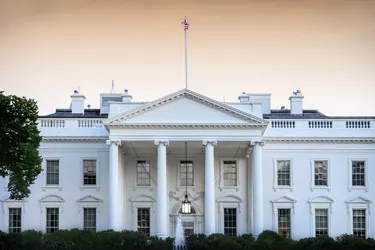Once confirmed by the Electoral College, the U.S. president becomes a federal employee. Upon taking office, the president receives a salary, plus a variety of great benefits and perks. In post-presidential life, the former president retains benefits and perks. Some carry over for an entire lifetime, while others do not.

Video of the Day
Salary
The salary for the president is set by law. The 2018 salary for the president is $400,000. This salary is double the amount paid to the president before 1999, when the law was amended. George Bush was the first president to receive the increased salary, up from $200,000. Presidential salaries have been raised periodically throughout the history of the country, with our first president, George Washington, receiving $25,000. The president's salary is taxable income, just like the paycheck of every other American.
Video of the Day
Key Benefits
The governing law on presidential compensation provides her with a $50,000 expense account per year that is not taxed. The president also receives an untaxed annual allowance of $100,000 for travel expenses and an entertainment allowance of $19,000. The president and family live in the White House and don't pay rent or the electric bill, but they are billed monthly for their own food and personal expenses such as dry cleaning. The president has unlimited access to the Camp David property owned by the United States.
The president's daily work in the West Wing is supported by more than 100 staff members paid by the federal government. All U.S. presidents and their immediate family members have free 24-hour security protection provided by the Secret Service. The president is eligible to buy health insurance through the health insurance exchange that the Affordable Care Act provides for members of Congress. However, the free healthcare provided by the White House Medical Unit usually makes this unnecessary. Although, the job makes these benefits somewhat difficult to enjoy, the president is eligible for paid holidays, sick leave and vacations, like most other Americans.
Retirement Benefits
When presidents leave office, they are eligible to receive a lifetime pension, currently $205,700 per year. The Presidential Transition Fund provides an allowance for expenses related to moving from the White House and resuming civilian life. The amount used by former presidents varies, but payments only continue for a maximum of seven months, from the 30th day after the term ends. If he elects to enroll in federal health insurance during his term, he continues to be covered for life, but only if he has been enrolled in a federal health insurance plan for a minimum of five years. One recent one-term president, Jimmy Carter, did not meet this requirement. Health insurance was not included in his retirement benefits.
A president also receive funds for an office with allowances for equipment, telephone costs, supplies, staff and free mail privileges. The retirement benefits also include a travel allowance for himself, two staff members and the president's spouse. These benefits continue throughout for life, as does the Secret Service protection. However, protection for the retired president's children ends at age 16. Protection for the president's spouse continues for life unless the couple divorces or the former president dies and the spouse remarries.
- U.S. House of Representatives: 3 USC Ch. 2: Office and Compensation of President, From Title 3—The President
- Cornell University: Presidential Pay
- Cornell University: 3 U.S. Code § 102 - Compensation of the President
- The White House: Executive Office of the President
- LA Times: Trump's Personal Healthcare Is Top Quality and, for Him, Free of Charge
- Federation of American Scientists: Congressional Research Service, Former Presidents: Pensions, Office Allowances, and Other Federal Benefits
- White House living not total free ride